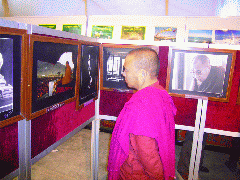Archives
Original Tibet showcased in Sikkim

The 1989 Nobel peace laureate further writes: “I too have fond memories of my several visits to Sikkim. In particular, I have been deeply moved when undertaking pilgrimage to sacred sites like Tashiding and Pemayangtse.”
His Holiness’ message, which was read out by Dhondup Dorjee, Tibetan Settlement Officer of Gangtok during the opening ceremony of the festival, also had hints on his favourite teachings on love and compassion. “The Buddhist cultural heritage in Sikkim among other major religious traditions encourages the cultivation of such ideals as compassion, peace and non-violence, which has a role to play in the development of the Sikkimese society,” he writes adding “Therefore, one way of getting benefit from this heritage and preserving it is to incorporate its message in the educational system”.
For a full five days, the Tibet Festival remained a crowd puller, mainly because it exhibited Tibet in its original form, its rich, colourful legacy still kept intact. Everything Tibetan was there – its culture, religion, Buddhist rituals, medicine and astrology, music and dance, costumes, art and craft, and cuisine.
“The festival expresses the preservation of Tibetan cultural identity that has been kept intact for the past 50 years,” said Karma Yougal, organising secretary.
In Sikkim, the settlement of the Tibetan community is in Gangtok and in Rabongla in South Sikkim. Most of them are entrepreneurs.
YISHEY D.

